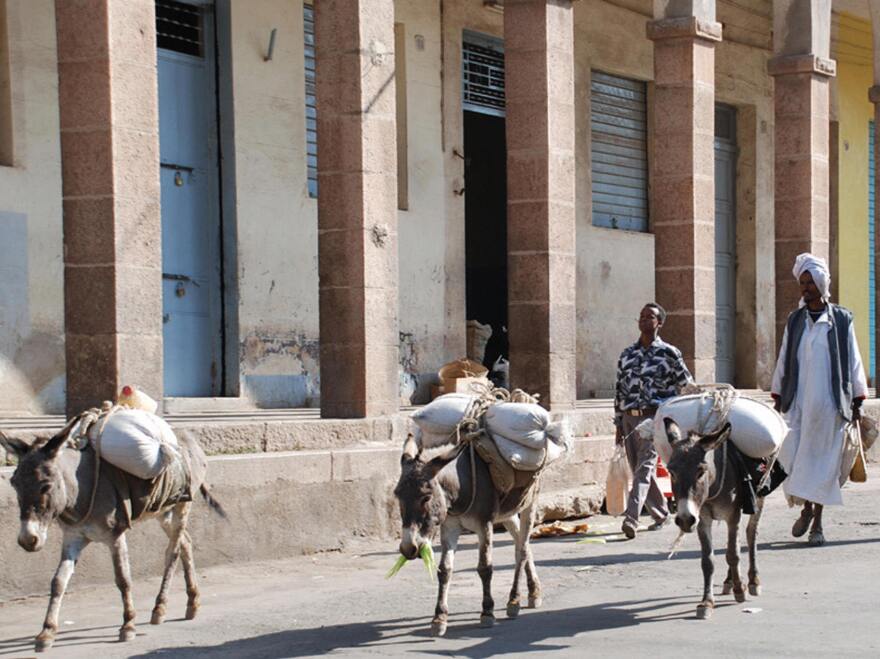Tucked in the northeast corner of Africa, Eritrea is one of the most closed societies in the world, so much so that it's sometimes dubbed the "North Korea of Africa."
President Isaias Afwerki does not tolerate any independent media. The Internet is restricted. Reporters without Borders recently named it 179th out of 179 countries for freedom of expression.
It's illegal to criticize the government — which could mean something as simple as complaining about the city power outage. Even gatherings of more than seven people might get you hauled into a police station.
"Even asking a question like, 'Where is my father?' if your father is in jail," says Isayas Sium, an Eritrean-American software engineer in San Jose, Calif., who left the country in 1995. "These are the questions you cannot ask, let alone protest or criticize the regime."
From his perch in California, Sium tries to stay politically connected to his country. He marches when there's a local demonstration, contributes to refugee causes and posts on Facebook.

But there's always one thing missing. The people inside Eritrea don't dare to "like" his Facebook posts. And they never march in the streets themselves. For Eritrean activists living abroad, this silence can be frustrating.
So Sium had an idea: If we can't ask them to come out, what if we ask them to stay home?
An Act Of Defiance
Eritreans typically hit the coffee shops and movie houses on Friday nights, so the idea was to use this as a passive resistance that hopefully could not be punished.
The movement was dubbed Freedom Friday, or Arbi Harnet in the Tigrinya language that is widely spoke in Eritrea. Sium and other activists abroad then had to inform Eritreans in a country with no free media. So they smuggled out a phone book, organized volunteers on Facebook and started cold-calling the fatherland.
"At first it was a strange thing," says London-based activist Selam Kidane, "for somebody that you don't know to phone you randomly and talk to you about things that are considered quite dangerous."
Sium agrees.
"The first question they ask is, where'd you get my number? Then we tell them, 'Oh, I don't know you, I got your number from the phone directory.' So some of them say, 'OK, thank you.' Some will just hang up after they hear our message," Sium says.
Robocalls To Eritrea
Encouraged by the response but frustrated by how few calls a couple of dozen volunteers could make on a Thursday night, they turned to a tool favored by telemarketers and loathed by dinner-eaters the world over. Freedom Friday got a robocall.
After the taped message was sent to 10,000 Eritrean phones, Kidane says, she learned something about her countrymen. They're not as fearful as she thought they'd be. According to inside sources and recent refugees who've fled, she says, staying home on Friday nights is becoming kind of cool.

"We thought that people would stay at home and not talk about it," Kidane says. "But it was seen as a fun thing, in the kind of jokey, young-people way that everybody was talking about it. Like, 'Oh, I didn't see you yesterday. ... Did you stay home because it's Freedom Friday?' That sort of thing."
It turned out that getting a phone call and staying home on date night are not things Eritreans worry about being punished for. But they became small acts of defiance.
Most Eritrean analysts say Freedom Friday has no chance of overthrowing the government. Emilio Manfredi, a consultant with the International Crisis Group, says that if or when change comes to Eritrea, it's much more likely to be a coup or military overthrow — not a popular movement from a people paralyzed by fear.
But Sium says the initial goal of Freedom Friday was never so grandiose as regime change. It was more of a cry into the void.
"This is also to see, can people hear us? Can they see us? So that is the idea. It's just linking the diaspora movement with what is inside," he says.
Some 95,000 phone calls later, a handful have actually called them back. They're saying they are ready to do more.
Copyright 2021 NPR. To see more, visit https://www.npr.org.



